At the 1908 Summer Olympics held in London, England, 26 athletics events were contested, all for men only. A total of 79 medals were awarded.

Martin John Sheridan was a three time Olympic Games gold medallist. He was born in Bohola, County Mayo, Ireland, and died in St. Vincent's Hospital in Manhattan, New York, the day before his 37th birthday, a very early casualty of the 1918 flu pandemic. He is buried in Calvary Cemetery, Queens, New York. He was part of a group of Irish-American athletes known as the "Irish Whales".
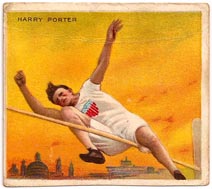
The men's high jump was one of six jumping events on the athletics at the 1908 Summer Olympics programme in London. The competition was held on Tuesday, July 21, 1908. Twenty-two high jumpers from ten nations competed. NOCs could enter up to 12 athletes. The event was won by Harry Porter of the United States, the nation's fourth consecutive victory in the men's high jump. There was a three-way tie for silver.

The men's standing high jump was one of six jumping events on the athletics at the 1908 Summer Olympics programme in London. The competition was held on July 23, 1908. 23 high jumpers from eleven nations competed. NOCs could enter up to 12 athletes. The event was won by Ray Ewry of the United States, his third consecutive victory in the event. Ewry won all eight standing jump events from 1900 to 1908 as well as both events at the 1906 Intercalated Games. Konstantinos Tsiklitiras of Greece took silver, tying with American John Biller. Tsiklitiras was the first non-American to medal in the event; the United States had swept the medals in both 1900 and 1904.

The men's standing long jump was one of six jumping events on the athletics at the 1908 Summer Olympics programme in London. The competition was held on Monday, July 20, 1908. Twenty-five long jumpers from eleven nations competed. NOCs could enter up to 12 athletes. The event was won by Ray Ewry of the United States, his third consecutive victory in the event. Ewry won all eight standing jump events from 1900 to 1908 as well as both events at the 1906 Intercalated Games. Konstantinos Tsiklitiras of Greece took silver. American Martin Sheridan earned bronze.
The men's freestyle javelin throw was one of six throwing events on the Athletics at the 1908 Summer Olympics programme in London. The javelin could be held anywhere, as opposed to the standard javelin throw which required the javelin to be held by a grip in the middle. This was the only time such a "freestyle" event was held at the Olympics. The competition was held on 15 July 1908. 33 throwers from nine nations competed. NOCs could enter up to 12 athletes.

The men's shot put was one of six throwing events on the Athletics at the 1908 Summer Olympics programme in London. The competition was held on July 16, 1908. 25 shot putters from eight nations competed. NOCs could enter up to 12 athletes. The event was won by Ralph Rose, successfully defending his title from 1904 and making it four consecutive Games that the event was won by an American. The two-Games streak of sweeps in 1900 and 1904 ended, however, as Denis Horgan of Great Britain took silver. Johnny Garrels of the United States took bronze. Rose was the second man to win two medals in the shot put ; Wesley Coe nearly was the third as he ended up in 4th place, only 11 centimetres behind Garrels.
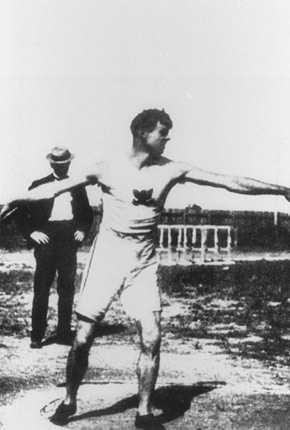
The men's discus throw was a track and field athletics event held as part of the Athletics at the 1904 Summer Olympics programme. It was the third time the event was held. The competition was held on Saturday, September 3, 1904. Six athletes from two nations competed.

The men's discus throw was a track and field athletics event held as part of the athletics at the 1912 Summer Olympics programme. The competition was held on Friday, July 12, 1912. Forty-one discus throwers from 15 nation competed. NOCs could enter up to 12 athletes. The event was won by Armas Taipale of Finland, the nation's first medal in the men's discus throw. Richard Byrd took silver and James Duncan took bronze to continue the United States' podium streak at five consecutive Games.

The men's discus throw was an event at the 1956 Summer Olympics in Melbourne, Australia. Twenty athletes from 15 nations competed. The maximum number of athletes per nation had been set at 3 since the 1930 Olympic Congress. The qualifying round and the final both were held on Tuesday November 27, 1956. The event was won by Al Oerter of the United States, the nation's second consecutive and ninth overall victory in the men's discus throw. It was the first of four straight gold medals for Oerter. The United States earned its second medal sweep in the event, as Fortune Gordien took silver and Des Koch took bronze. Gordien became the fifth man to win two medals in the event, and the first to do so in non-consecutive Games. Italy's three-Games medal streak in the event ended.
The men's discus throw was an event at the 1996 Summer Olympics in Atlanta, Georgia. There were 40 competitors from 30 nations. The maximum number of athletes per nation had been set at 3 since the 1930 Olympic Congress. The final was held on July 31, 1996. The event was won by Lars Riedel of Germany, the nation's first victory in the men's discus throw. Belarus won two medals in its debut, with Vladimir Dubrovshchik earning silver and Vasiliy Kaptyukh taking bronze.
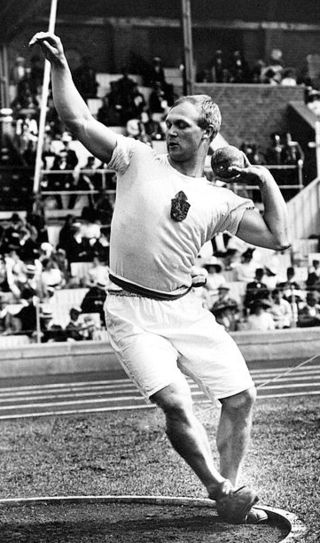
The men's discus throw event was part of the track and field athletics programme at the 1920 Summer Olympics. The competition was held on Saturday, August 21, 1920, and on Sunday, August 22, 1920. 17 discus throwers from eight nations competed. No nation had more than 4 athletes, suggesting the limit had been reduced from the 12 maximum in force in 1908 and 1912. The event was won by Elmer Niklander of Finland, the nation's second consecutive victory in the men's discus throw. Armas Taipale, the winner in 1912, took silver to become the second man to win multiple medals in the event. Gus Pope took bronze, continuing the American streak of podium appearances at all six discus competitions to date.

The men's discus throw event was part of the track and field athletics programme at the 1924 Summer Olympics. The competition was held on Sunday, July 13, 1924. 32 discus throwers from 18 nations competed. The maximum number of athletes per nation was 4. The event was won by Bud Houser of the United States, the nation's fourth victory in the men's discus throw ; the Americans had medalled in each of the Olympic discus throw events to date. Houser had also won the shot put. Vilho Niittymaa took silver, keeping Finland on the podium in the event for the third straight Games. Thomas Lieb gave the United States its second discus throw medal of 1924, with his bronze.

The men's discus throw event was part of the track and field athletics programme at the 1928 Summer Olympics. The competition was held on Wednesday, August 1, 1928. Thirty-four discus throwers from 19 nations competed. The maximum number of athletes per nation was 4. The event was won by Bud Houser, the second man to successfully defend Olympic gold in the discus throw. It was the fifth American victory in the event. As in 1924, silver went to Finland and bronze to the United States.
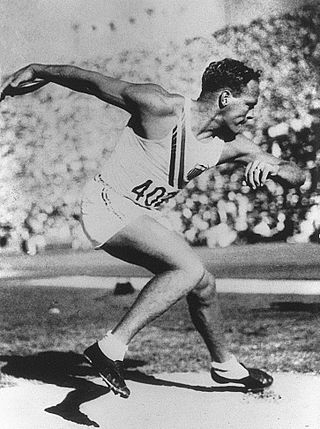
The men's discus throw event at the 1932 Olympic Games took place August 3. Eighteen athletes from 11 nations competed. The 1930 Olympic Congress in Berlin had reduced the limit from 4 athletes per NOC to 3 athletes. The event was won by John Anderson of the United States, the nation's third consecutive and sixth overall victory in the men's discus throw. Henri LaBorde took silver, marking the first time since 1908 that the same nation had the top two discus throwers. Paul Winter was the bronze medalist, earning France's first discus medal. Finland's four-Games podium streak ended, while the United States extended its streak to all nine appearances of the event.

The men's discus throw event was part of the track and field athletics programme at the 1936 Summer Olympics. The competition was held on August 5, 1936. Thirty-one athletes from 17 nations competed. The maximum number of athletes per nation had been set at 3 since the 1930 Olympic Congress. The final was won by Ken Carpenter of the United States. It was the nation's fourth consecutive, and seventh overall, victory in the men's discus throw; it was also the second consecutive Games that the Americans finished with both of the top two places, as Gordon Dunn took silver. Giorgio Oberweger earned Italy's first men's discus throw medal with his bronze.
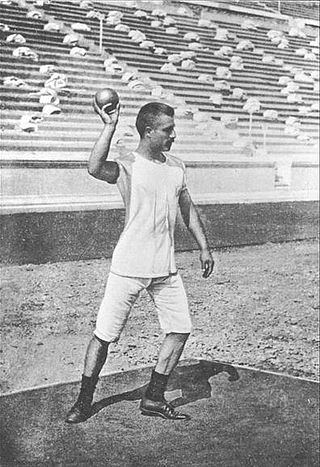
The shot put at the Summer Olympics is one of four track and field throwing events held at the multi-sport event. The men's shot put has been present on the Olympic athletics programme since 1896. The women's event was added to the programme at the 1948 Olympics just over fifty years later.

The discus throw is one of four track and field throwing events held at the Summer Olympics. The men's discus throw has been present on the Olympic athletics programme since 1896. The women's event was first contested at the 1928 Olympics, being one of the five athletics events in the inaugural Olympic women's programme.

The javelin throw at the Summer Olympics is one of four track and field throwing events held at the multi-sport event. The men's javelin throw has been present on the Olympic athletics programme since 1908, being the last of the current throwing events to feature at the Olympics after the shot put, discus throw and hammer throw. The women's event was first contested at the 1932 Olympics, becoming the second women's throws event after the discus in 1928.

Combined events at the Summer Olympics have been contested in several formats at the multi-sport event. There are two combined track and field events in the current Olympic athletics programme: a men's decathlon and a women's heptathlon.

















